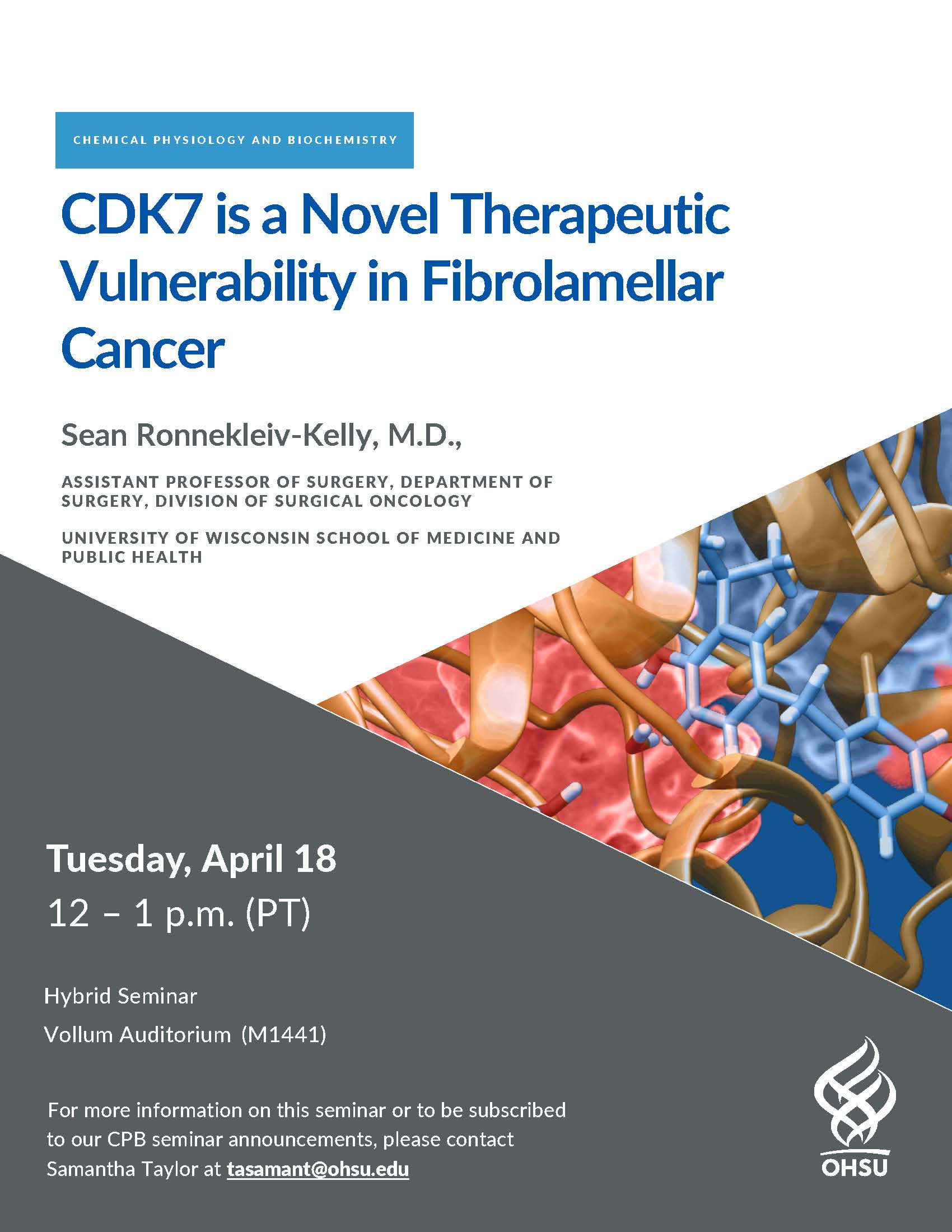CDK7 is a Novel Therapeutic Vulnerability in Fibrolamellar Cancer, Presented by Sean Ronnekleiv-Kelly, M.D., FACS, Assistant Professor of Surgery, Department of Surgery, University of Wisconsin School of Medicine and Public Health
| When |
April 18, 2023
12 p.m. to 1 p.m.

Abstract: Fibrolamellar Carcinoma (FLC) is a rare but lethal cancer that afflicts young healthy individuals. The tumor arises in the background of a healthy liver and patients typically present with advanced cancer at the time of diagnosis. Unfortunately, for these patients with advanced or recurrent cancer, no proven systemic therapies exist, and overall survival is only 30-45% at 5 years. Investigations into the molecular underpinning of FLC have revealed a unique gene fusion between heat shock protein 40 (DNAJB1) and the catalytic subunit alpha of protein kinase A (PRKACA), leading to formation of an oncoprotein (DNAJ-PKAc) that retains kinase activity and is the proven tumor-causing event in FLC. To uncover potential therapeutic targets, we created an FLC cell line by introducing the DNAJB1-PRKACA oncogene rearrangement into human hepatocellular cells (HepG2). We identified aberrant cell cycle progression, and RNA sequencing as well as protein analysis revealed evidence of altered (enhanced) CDK7 activation in the DNAJB1-PRKACA expressing FLC cells. These findings were confirmed in human samples of FLC. In turn, targeting of CDK7 with selective inhibitors demonstrated efficacy in human cancer-derived models of FLC, with minimal toxicity in normal liver. Collectively, this work uncovers a novel therapeutic vulnerability in human-derived models of FLC. |
|---|---|
| Where |
Campus:
Building:
3232 SW Research Drive
Portland,
Oregon
97239
Room: M1441 Vollum Auditorium
|
| Contact Information |

Abstract:
Fibrolamellar Carcinoma (FLC) is a rare but lethal cancer that afflicts young healthy individuals. The tumor arises in the background of a healthy liver and patients typically present with advanced cancer at the time of diagnosis. Unfortunately, for these patients with advanced or recurrent cancer, no proven systemic therapies exist, and overall survival is only 30-45% at 5 years. Investigations into the molecular underpinning of FLC have revealed a unique gene fusion between heat shock protein 40 (DNAJB1) and the catalytic subunit alpha of protein kinase A (PRKACA), leading to formation of an oncoprotein (DNAJ-PKAc) that retains kinase activity and is the proven tumor-causing event in FLC. To uncover potential therapeutic targets, we created an FLC cell line by introducing the DNAJB1-PRKACA oncogene rearrangement into human hepatocellular cells (HepG2). We identified aberrant cell cycle progression, and RNA sequencing as well as protein analysis revealed evidence of altered (enhanced) CDK7 activation in the DNAJB1-PRKACA expressing FLC cells. These findings were confirmed in human samples of FLC. In turn, targeting of CDK7 with selective inhibitors demonstrated efficacy in human cancer-derived models of FLC, with minimal toxicity in normal liver. Collectively, this work uncovers a novel therapeutic vulnerability in human-derived models of FLC.